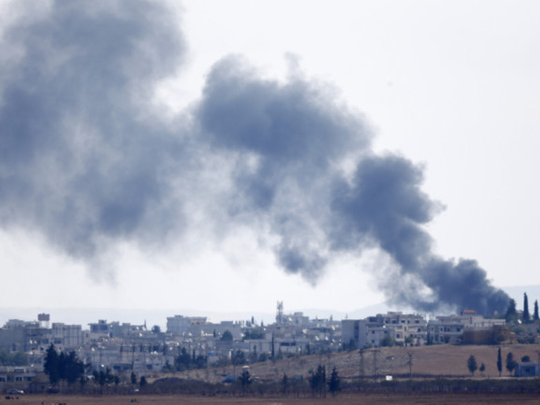
It is amazing how Arab public opinion can change in a matter of a few weeks, from one extreme to another. Just a few weeks ago, most Arab commentators where in favour of the American-led campaign against Daesh (the Islamic State of Iraq and the Levant), in which Washington’s Arab allies are also involved. But soon things changed, and conspiracy theories came to the fore for columnists and TV commentators. The theory, as it prevails, starts with the question. Is there something fishy going on? At the least, there is a lack of clarity about the campaign. A number of serious objections are being raised by suspicious commentators. Firstly, the cost of the campaign is alarming. Estimates suggest that it could reach a whopping $500 billion (Dh1.8 trillion) in the long run. In comparison, a campaign as big as the one to liberate Kuwait cost $400 billion. So it is obvious that the estimated cost for this campaign is exaggerated. And most of this money will come from the Arab Gulf countries.
If we consider the fact that oil prices are falling sharply, the conspiracy theory gains credence. It suggests that there is a plan to reduce oil prices by the big powers on the one hand and deplete the financial resources of Arab countries on the other, thereby paving the path for unexpected social and political upheaval in these countries. So far, these countries have been immune from the negative effects of the “Arab Spring”.
On the ground, such conspiracies find takers. For instance, the Kuwaiti government recently raised the prices of kerosene and diesel. It was speculated in the media that even electricity and water prices would go up, and such measures could be implemented in other Gulf states, reflecting both the fall in oil prices and the financial burden of the military campaign against Daesh which, as some have predicted, will take years rather than months.
Iran the only beneficiary
On the other hand, some commentators have doubts about the outcome of the campaign against Daesh. They think Iran will probably be the only beneficiary, directly or indirectly. Iran’s ties with the Bashar Al Assad regime in Syria are well known. And the Iraqi government is a client regime of Tehran. All three entities are benefiting from fighting the Sunni elements. And hence, a growing number of Sunnis in the region see this as true, bearing in mind some statements coming from prominent American politicians such as Secretary of State John Kerry, who said at the United Nations recently that there was room for every power in the region to participate in the fight against Daesh (including Iran).
This statement alarmed some quarters in the Sunni camp, who thought that some sort of under-the-table deal had been struck between the US and Tehran. To make this kind of argument more convincing, some hint at the fact that both the Syrian and the Iranian regimes were initially vehemently opposed to any action, military or otherwise, on Syrian soil without the consent of the Syrian government. But now, they not only deliberately ignore the air strikes, but also look very pleased with what the allies are doing over their airspace! No words of objection coming from Tehran either.
Other doubts about the final purpose of the campaign are over the ‘day after scenario’, which was ignored during the Iraqi campaign in 2003, and because of that negligence, disaster has struck Iraq and the region. People are very cautious, and want to know what the allies have in mind for the region over the long term.
Dismantling the Al Assad regime
The Turks’ idea is more sound; they think that the end result of this camping should be the dismantling of the Al Assad regime, which is becoming a burden for the entire region. Even the Iranians will not strongly object if they find that the new regime is not entirely against their long-term interests.
This is what happened in Iraq, where Tehran eventually let prime minister Nouri Al Maliki go and accepted a more moderate premier in Baghdad. This changing of the regime could be cheaper in the long run, and a more effective way to fight terrorism in the region.
But the more serious objection to the campaign is that people realise that what they are fighting is an ideology and its needs another ideology to counter it, rather that fighter planes and weapons. And the allies thus far have no coherent ideology. Unless they hammer out between themselves an acceptable counter-ideology, or at least a valid outline of what kind of political future they envisage for the region, their efforts, with all the costs, will have a limited impact, and probably side effects for entire region in the future.
These points, raised by many Arab commentators, are worth looking at seriously. To ignore them is to repeat the mistakes of the past. The price — in lives and money — will be paid by the people of the region who have witnessed wars for the past half-century and have already paid dearly.
Mohammad AlRumaihi is a professor of political sociology at Kuwait University. You can follow him on Twitter at www.twitter.com/@rumaihi42








